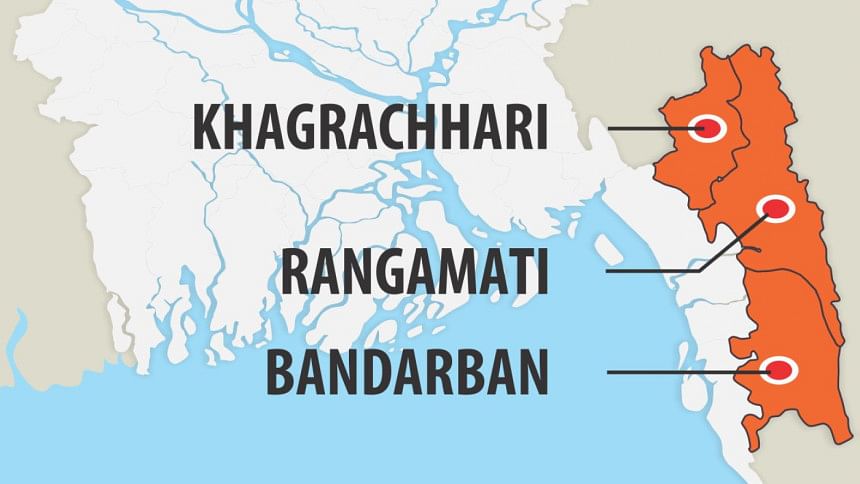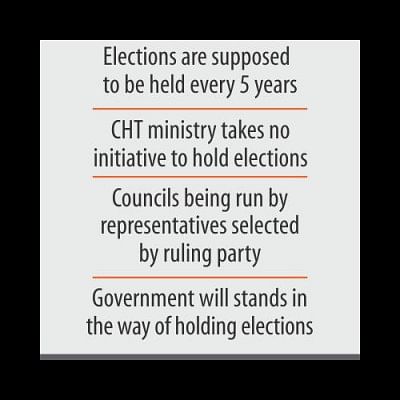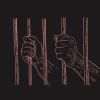No election in two decades

The lack of government will over holding elections to the regional council and the three district councils in Chittagong Hill Tracts has long been depriving indigenous people of their right to have elected representatives in those local bodies.
For almost two decades, the district councils have been running by those chosen by the ruling parties.

The absence of elected public representatives in the councils and lack of accountability keep hampering the public-oriented services in the region, said local government experts and others concerned.
Besides, the promotion of political rights and progress of socio-economic development of the indigenous people, as promised in the the 1997 CHT Peace Accord, have also slowed down, they said.
The experts said election to the councils should be held within the “shortest possible time” to help fully implement the accord and allow the indigenous people to enjoy a “special ruling system” as mentioned in the accord.
The first local government councils were introduced in Rangamati, Khagrachhari and Bandarban in 1989, 18 years after the country's independence. The only elections to the councils were held the same year.
Through the polls, each of the councils got a chairman and 30 members, who included Bangalees.
However, when the tenure of the bodies ended in 1992, they went to the hands of the representatives selected by then ruling party BNP.
Five years later, the CHT Peace Accord was signed between the then Awami League government and Parbattya Chattagram Jana Sanghati Samiti (PCJSS). The three councils were reintroduced as district councils following the agreement.
In 1997, some major changes were brought to the councils. One of them was that their tenure was extended to five years from three.
In line with the peace accord, the regional council was formed the following year and was tasked with supervising the three district councils and ensuring coordination among them.
However, the regional and the district councils are yet to go to polls.
Since its inception, the regional council has been running under the leadership of PCJSS President Jyotirindra Bodhipriya Larma, popularly known as Santu Larma, who is its chairman.
But Santu Larma on a number of occasions criticised the government for its “reluctance” to make the regional and district councils properly functional.
Sajib Chakma, assistant information and publicity secretary of PCJSS, said they urged the governments several times to hold elections to the councils. “But our repeated pleas fell on deaf ears,” he said.
Talking to The Daily Star, Goutam Dewan, who was elected chairman of Rangamati local government council in 1989, said the district councils were established to introduce a special ruling system in the hills.
“However, they have become dysfunctional as those were not formed by people's vote,” said Goutam, now president of CHT Nagorik Committee, a civil society platform.
“The government is betraying with the people in the hills by not holding the elections,” he said.
Naba Bikram Kishore Tripura, former secretary of the CHT affairs ministry, said, “Although there are some complexities in arranging the polls, sincerity from the government can solve the issue.”
Chakma Circle Chief Barrister Raja Debasish Roy, however, said there was no legal bar to formulate rules for holding the elections.
“As elections to the district councils were not held in the last 26 years, the councils have no accountability to the indigenous people who are deprived of various government benefits,” he said.
Contacted, local government expert Dr Tofail Ahmed said the regional and the district councils were formed on the ground that the CHT people had long been struggling to get regional autonomy.
The aim was that the councils would provide a certain group of people with a “comfort zone to resolve their pending issues and also the sense that they themselves were ruling the region”, he said,
“But the councils are not functioning accordingly. As a result, stray incident of violence are not ending,” he said.
Making the CHT district councils and regional council effective was very much essential for the wellbeing of the people living in the hills, he added.
While district councils in all the other 61 districts of the country fall under the jurisdiction of the local government division, the three district councils in Rangamati, Khagrachhari and Bandarban are under the CHT affairs ministry.
Dipankar Talukdar, a former state minister for CHT affairs, said during his tenure he sent several letters to the then chief election commissioner, requesting him to take initiative for the polls.
“But he did not pay any heed,” he said, adding the EC had “no visible interest in the elections”.
Denying the allegation, EC Secretary Helal Uddin Ahmed said the commission did not receive any such letter from the ministry in the last 20 years.
“How can we arrange election if the ministry does not request us,” he said.
Sultana Kamal, co-chair of the CHT commission, said holding elections to the district councils was prerequisite for the full implementation of the peace accord.
She said demographics of the hills have changed over the years while the overall political atmosphere has also become “more anti-indigenous people”.
“As elections did not take place for many years, its long-lasting negative impact on the region's political atmosphere can be apparent now,” she added.
Sultana said elections to the councils should be held soon while liberty of the institutions is also essential for their proper functioning. Moreover, locals have to cooperate with the elected representatives, she added.
Meanwhile, locals alleged that “district councils were turning into branches of ruling party's office”.
Prof Thanjama Lusai, former chairman of Bandarban district council, said the district councils have become “money-making centres for ruling party men”.
Chai Thow Aong Marma, former chairman of Khagrachhari district council, said for ensuring development work, each district council receives around Tk 40 crore every year through the CHT affairs ministry.
The Daily Star contacted State Minister for CHT Affairs Bir Bahadur U Shwe Sing several times over the phone but he refused to make any comment on the issue.
This newspaper also tried to reach the current chairmen of the district councils for comments but failed.
According to the 2011 population census, Rangamati had a population of around 6.2 lakh while Khagrachhari 6.13 lakh and Bandarban 4.04 lakh. The people were both from the ingenious and Bangalee communities. Latest data on the population was not available.
[Our Rangamati correspondent Anvil Chakma and Khagrachhari correspondent Saikat Dewan contributed to this report]

 For all latest news, follow The Daily Star's Google News channel.
For all latest news, follow The Daily Star's Google News channel. 






Comments